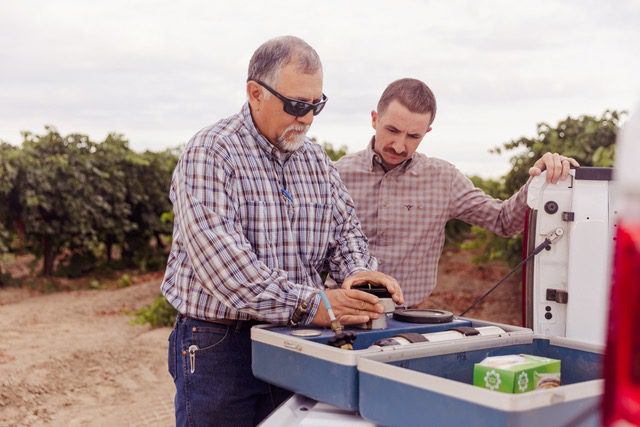
Whether a farm manager answers to a corporate office or to family members, whether farm managers oversee 1000s of acres or less than 100, they need to possess a variety of personal skills that will help them succeed in delivering a high-yielding and high-quality crop. These skills also help foster good working relationships with coworkers.
While specific skills related to crop nutrition, irrigation and pest control are valuable, there are important managerial skills that cannot be overlooked. Stephen Vasquez, chairman of Western Region Certified Crop Advisors board of directors and executive director of California Pistachio Research Board, provided his list of the top five skills he considers essential to be an effective farm manager: good communication, critical thinking, data analysis proficiency, self-awareness and general field knowledge. While farm managers can have expertise in many aspects of crop production, Vasquez said possession of these skills allows for more effective management of people and crops. It also helps to have an open mind and be able to learn from experiences of others in the workplace.
“There is no substitute for experience,” Sam Dolcini of AGRI Associates, a Kansas-based agriculture recruiter, said. California experience is also valuable due to the uniqueness of farming in the state. Managers also need to be willing to learn from others, be flexible when situations change and be resilient, he added.
1. Good Communication
Optimal verbal and written skills will allow the manager in charge to communicate with the people he oversees about work that needs to be done and be able to respond to questions about the job. Communication includes training in specific tasks or instructions on how a job should be done and when a job should be done and listening to employee concerns. Managers also need to communicate effectively with a myriad of state and federal regulators, inspectors and agencies about farm operations. Communication means dealing with regulations, asking specific questions about regulations that pertain to the farming operations and understanding how to respond to regulators.
An example of good verbal communication could be a review of company harvest safety rules. The first round starts with supervisor and farm managers as they review past seasons and safety hazards, develop solutions and update the safety plan. The next step in communication would be identifying employees to help implement the plan. Continued communication ensures the plan is being implemented correctly.
2. Critical Thinking
Every day on the job will present a new challenge. Managers will need to solve multiple issues every single day. All days are different, and managers must be able to understand a problem and look at it from different viewpoints. They also must help employees understand and deal with the challenges.
A good critical thinker will take in as much information as possible regarding an issue, formulate a solution or multiple solutions and begin the process of solving a problem. As the solutions are being carried out, a good critical thinker will evaluate progress and, if necessary, make changes to be successful. A good critical thinker will not have a problem scrapping one plan and implementing a second, or better, plan.
3. Data Analysis
Managers need to be able to evaluate data quickly. This involves knowing when improvements are needed in irrigation, crop nutrition, pest control and other aspects of the farming operations. An example would be a spray crew applying a material that is calibrated for covering six acres. Observation of the operation shows they are covering more acres than calculated. What information would a manager need to gather? Why is this happening? Is the spray rig driver speeding or skipping rows? Managers must be able to pull the data together and communicate what needs to change.
Or having multiple years of growing data for a particular crop at different locations and knowing that the crop cannot be farmed or harvested the same at all locations due to different variety and rootstock combinations. The soil, water and climate at each location all play roles in crop quality and maturation. Knowing the site impacts quality and maturity, the goal of the manager would be to develop a management plan and use the data to manage all sites to minimize costs (this could also fall under critical thinking.)
4. Self-Awareness
A manager must know themselves and their limitations in production knowledge and when to call in support or advice. Education, experiences, talent and skillset can all be added up, but self-awareness is being comfortable not knowing everything and allowing someone else to take the lead or teach you what you need to know. No one can know it all. Being self-aware means knowing when support is needed and realizing there is something new to be learned. Managers should also be able to recognize when an employee can provide an improved management method and to trust their knowledge.
An example would be a manager with basic knowledge of artificial intelligence (AI) robotics and automation. A new employee is hired right out of college with experience in AI automation and harvesting apples. He is now working for a stone fruit company that wants to take advantage of that technology to automate harvest. Making sure the new employee has all the resources needed to be successful and letting them lead the project demonstrates the manager is aware of his limitations and the abilities of the new hire.
5. General Field Knowledge
Managers must know the crops they are farming under many different scenarios including crop health, stress, pests and diseases. This knowledge includes understanding how the environment at different field locations. Skills include good understanding of soils, irrigation, plant nutrition, horticulture, entomology and plant pathology among others. Working knowledge of machinery used in production includes pump maintenance, tractors, harvest equipment and specialized machinery like spray rigs is important.
Other ‘must haves’ in general knowledge include weather monitoring capability and using both private and state-run weather networks like the California Irrigation Management Information System. To access information, knowing farm software for crops, regulations and human resources is important.
The managerial five skills can be acquired or they can be honed, Vasquez said, as there are opportunities with several leadership programs. The American Pistachio Growers LeadOn Program is a year-long program designed to provide leadership training and industry education seminars. The Almond Leadership program aims to master communication and leadership techniques.

Cecilia Parsons | Associate Editor
Cecilia Parsons has lived in the Central Valley community of Ducor since 1976, covering agriculture for numerous agricultural publications over the years. She has found and nurtured many wonderful and helpful contacts in the ag community, including the UCCE advisors, allowing for news coverage that focuses on the basics of food production.
She is always on the search for new ag topics that can help growers and processors in the San Joaquin Valley improve their bottom line.
In her free time, Cecilia rides her horse, Holly in ranch versatility shows and raises registered Shetland sheep which she exhibits at county and state fairs during the summer.















